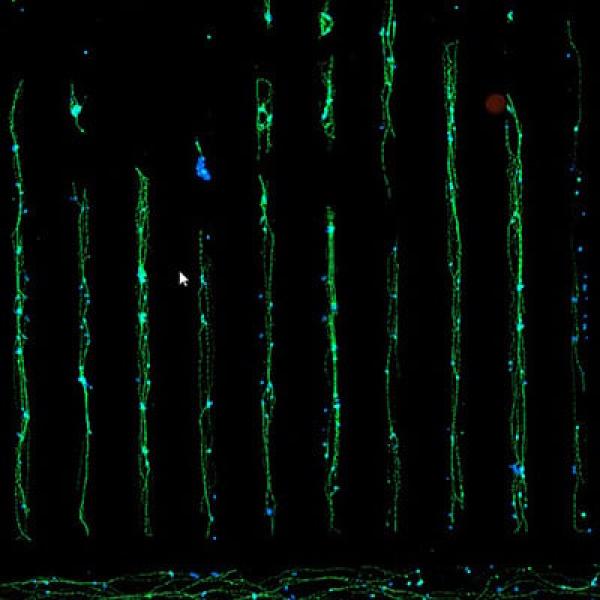Neural Pathways in Focus: From Synaptic Transmission to Tumor Progression
Powering Neurons with Light: Using Optogenetics to Study Synaptic Propagation
Our first speaker, Austin Passaro, will present an innovative assay for studying synaptic transmission.
Synaptic connections are crucial for neuronal function, but traditional in vitro models limit studying synaptic propagation, as they are only comprised of a single circuit. Here, he will present a simple synaptic propagation assay using two distinct cortical neuron circuits. First, neurons were seeded in separate compartments of an ibidi Culture-Insert within a multielectrode array (MEA) plate. After removing the insert, cultures matured, and functional connections formed between populations. One population expressed ChR2 for optogenetic stimulation, while the other served as a readout for synaptic propagation. Finally, dosing with synaptic blockers validated the ability to detect changes in propagation.
This assay offers an effective alternative to animal models for studying synaptic transmission.

Austin Passaro received a PhD in Neuroscience from the University of Georgia in 2021, specifically focusing on neural stem cell biology and neurological disorder research using complex in vitro models, such as microfluidics and organoids. For the past 4+ years at Axion Biosystems, he has worked to promote and improve multielectrode array technology for a wide range of applications such as disease modeling, drug discovery, and toxicology.
Cancer Takes a Nerve
Our second speaker, Moran Amit, will highlight key discoveries at the intersection of neuroscience and oncology.
Cancer neuroscience is an emerging discipline revealing how the nervous system profoundly shapes cancer biology. Recent advances show that both central and peripheral nerves interact directly with tumor cells and the immune microenvironment, influencing tumor growth, invasion, and therapy resistance. Microscopy-based studies have uncovered intricate neural-cancer crosstalk, including perineural invasion and nerve remodeling within tumors, with implications for prognosis and treatment response. Novel imaging approaches illuminate the cellular and molecular mechanisms by which nerves modulate cancer progression, opening avenues for targeted interventions.
This presentation will highlight key discoveries at the intersection of neuroscience and oncology, with a focus on how advanced microscopy is unraveling these complex interactions.

Dr. Amit was recruited to the Department of Head and Neck Surgical Oncology at The University of Texas MD Anderson Cancer Center in April 2019 and has an active research laboratory focusing on cancer-related neurogenesis and axonogenesis as well as the role of neuro-immunology in cancer. One exciting finding of Dr. Amit’s lab involved describing a mechanism by which head and neck tumors can reprogram adrenergic signaling in neurons and the effect of targeting the peripheral nervous system on cancer initiation and progression. This will serve as a basis for combining treatments targeting the nervous system with other therapies, such as immunotherapy, in the treatment of head and neck cancers.

